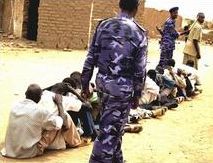A violent day in Khartoum’s suburbs – BBC
By Jonah Fisher, The BBC News
KHARTOUM, May 24, 2005 — When I arrived at the displaced persons settlement of Soba Aradi on the outskirts of Khartoum at 0730, the security cordon had been up for a few hours.

|
|
A group of arrested people wait to be loaded into trucks to take them to central Khartoum from their camp for displaced people just south of the town Tuesday, May 24, 2005. (AP). |
Every 10 metres, there was a riot policeman or soldier, backed up along the line by machine-guns mounted on the back of pick-up trucks. No-one was allowed in or out.
The men were tense, each no doubt aware of what had happened six days earlier when 14 policemen were killed along with a number of residents, including a child.
Having been warned away from the cordon by security, I retreated to my taxi with a news agency photographer, watching what was going on from a distance.
We saw soldiers going from house to house, and people put in trucks and driven away.
Beaten
After about an hour, my colleague ventured out of the taxi to try and take some photos.
When they saw this, security forces raced towards us and our taxi.
Despite immediately showing our press credentials, the photographer, myself, and the taxi driver were grabbed and thrown into the back of a truck.
We were made to squat on the floor, and were hit repeatedly on the back of our heads as we were driven away.
On the drive through Soba Aradi to the security headquarters, we saw the scale of the operation.
More than 6,000 soldiers and police officers had been deployed in an overwhelming show of force.
Release
Once at the headquarters, we were forced on our knees in front of their commander, a man named Badawi.
He snarled at us, but his hostile attitude soon disappeared when we were allowed to telephone senior people in the government press office to prove our identities.
A small graze on my hand was gently swabbed and bandaged in the back of a van as they made arrangements for us to be released.
Badawi stood there chatting to me, assuring me that what we’d just experienced was “standard procedure, so no problem”.
I told him we’d been hit.
“Point me out the man and I will punch him in the face myself,” he assured me. I said I couldn’t remember.
Less than an hour after our arrest, we were released outside Soba Aradi police station.
The next truckload of arrested people was just arriving.
Men both old and young, as well as two women, were taken off.
There was no sign of resistance, but the enthusiastic use of the cane which I had seen all day was evident both from the guard’s swinging arms and the blood on some of the men’s shirts.
